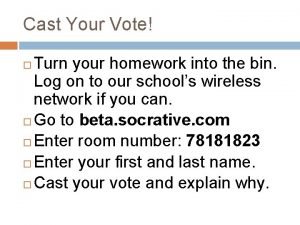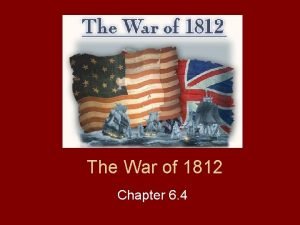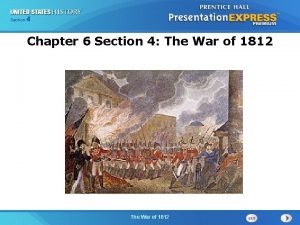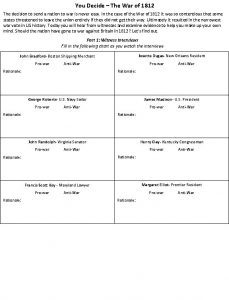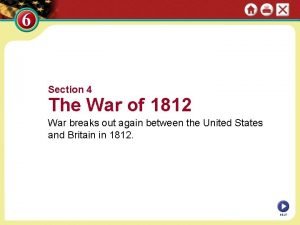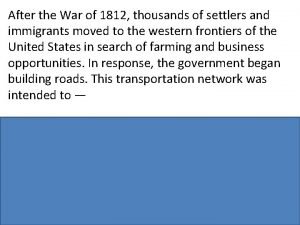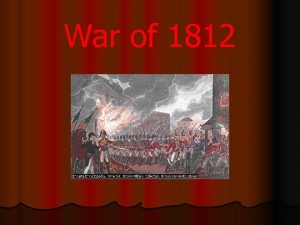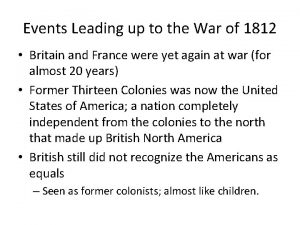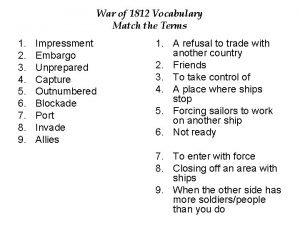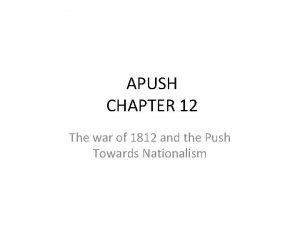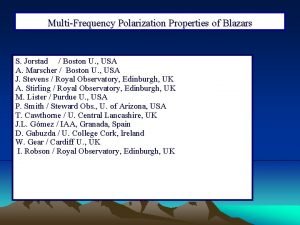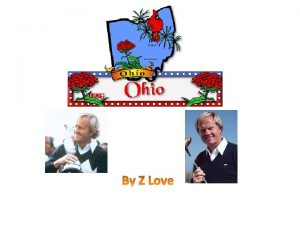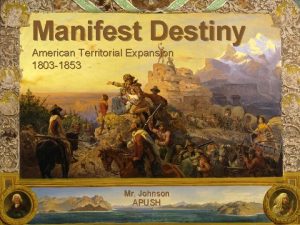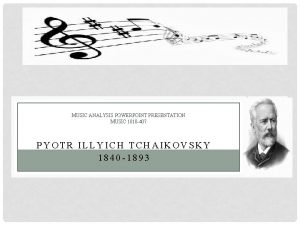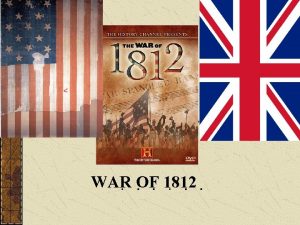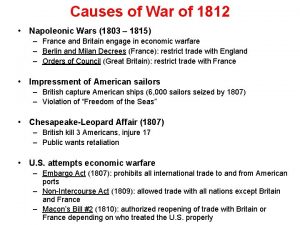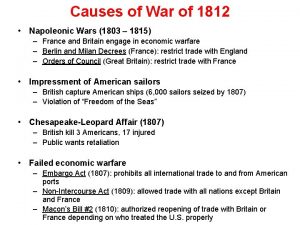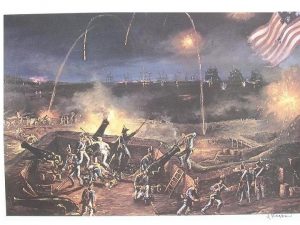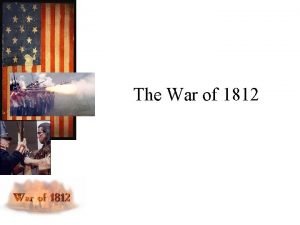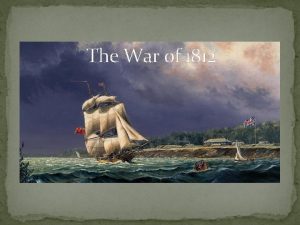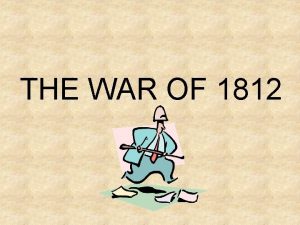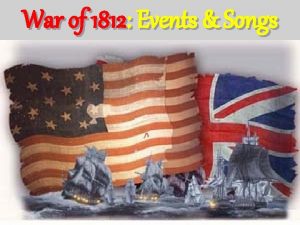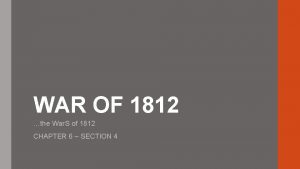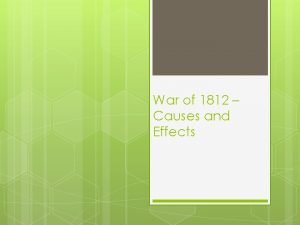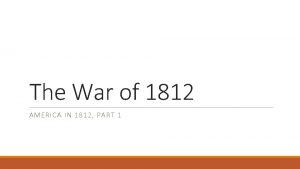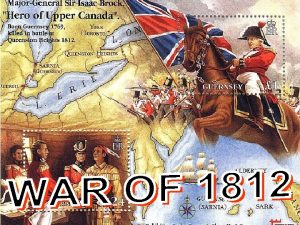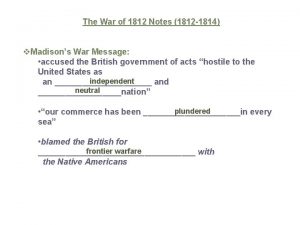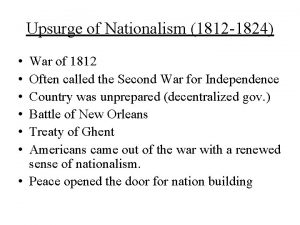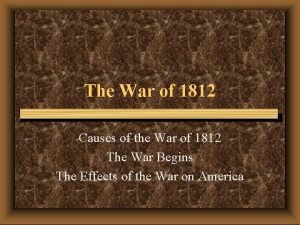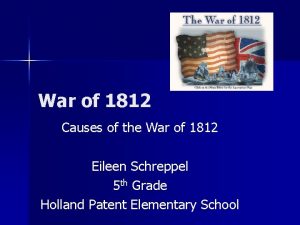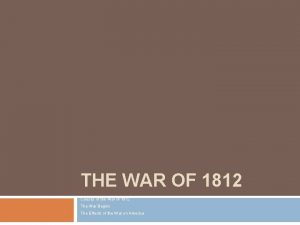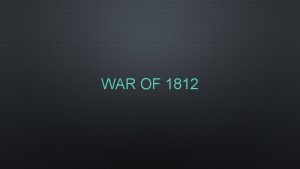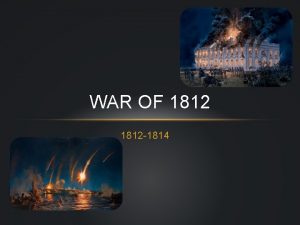Causes of the War of 1812 In 1803























- Slides: 23


Causes of the War of 1812 • In 1803, Britain and France went to war again. Great Britain • Both countries seized U. S. ships sailing towards the ports of their enemy. France

• Britain continued its’ impressment of U. S. sailors. Between 1808 and 1811 over 6, 000 Americans were impressed by the British.

British ships frequently stopped American ships, confiscated their cargo, and impressed (captured) crew members, claiming they were deserters from Britain’s Royal Navy.

I know what to do! If we don’t allow American ships to trade with anyone, then they won’t get attacked! True, but President Thomas Jefferson American merchant Mr. President, that’s not the British what I had in and French keepmind! seizing American merchant ships. Something must be done!

Embargo Act (1807) • The Embargo Act banned U. S. ships from trading with any country. • All imports and exports were banned! • This hurt the U. S. economy! Non-Intercourse Act (1809) • Trade with all nations was allowed except Britain or France.

War Hawks – members of Congress, led by Henry Clay of Kentucky, that wanted to declare war on Great Britain 34 year old Henry Clay, Speaker of the U. S. House of Representatives and War Hawk leader.

War Hawk’s Rationale for War I. Nationalism – pride or devotion to one’s country I. II. Many Americans felt that Great Britain still treated the United States like a British colony. Revenge I. War Hawks wanted to revenge on British for seizing American ships III. Territorial Expansions I. Henry Clay wanted an excuse to conquer Canada from Great Britain and Florida from Spain. IV. Native American Attacks I. War Hawks felt that Great Britain was arming Native Americans on the frontier and encouraging them to attack Americans.

The Prophet and Tecumseh • Tenskwatawa, also known as “The Prophet”, believed that in order to survive, Native Americans had to give up white ways of life. Tenskwatawa, also known as “The Prophet” • Tecumseh unified many tribes behind the message of the Prophet, who was his older brother.

• In 1808, the Prophet built a village for his followers in Tippecanoe, Indiana.

Battle of Tippecanoe 1811 • Shawnee Indian Tecumseh and his brother encouraged Native Americans tribes to again form a confederacy to stop the advance of white settlement • Indiana Territory governor William Henry Harrison led US troops into the Indian settlement of Prophetstown along the Tippecanoe River and defeated Natives led by Tecumseh’s brother. • The defeat of the Natives by the US forces pushed some Natives, especially Tecumseh, to make alliances with the British during the War of 1812 • Tecumseh was killed at the Battle of Thames during the War of 1812, and his death signaled the weakening of Native support for the British Battle of Tippecanoe made Harrison a war hero & helped him become president of the US in 1840

American Problems Ø The US was unprepared militarily: § Had a 12 -ship navy vs. Britain’s 800 ships. § Americans disliked a draft preferred to enlist in the disorganized state militias. Ø Financially unprepared: § Flood of paper money. § Revenue from import tariffs declined. Ø Regional disagreements.

Overview of the War of 1812

3 U. S. Invasions of 1812

Campaigns of 1813

Battle of Fort Mc. Henry, 1814 Oh Say Can You See By the Dawn’s Early Light… Francis -- Scott Key

Gave proof through the night, That our flag was still there. .

Attack on Ft. Oswego, 1814 Results? • British gained 2400 barrels of supplies • British captured schooners • Missed the opportunity to gain weapons as they were on the way to Oswego at the time of attack

Hartford Convention December, 1814 – January, 1815

Treaty of Ghent December 24, 1814

Treaty of Ghent December 24, 1814 • Peace was established on quo ante bellum – Things go back to the way they were before the war

The Battle of New Orleans, 1815 • Occurred after the war officially ended • January 1815, British landed with 7500 troops in New Orleans • Andrew Jackson used cotton bales as defense and then easily picked off the British in an open field • Made Andrew Jackson a national hero

Jackson’s Florida Campaigns
 Cast your vote war of 1812 answer key
Cast your vote war of 1812 answer key The war of 1812 chapter 6 section 4
The war of 1812 chapter 6 section 4 Chapter 6 section 4 the war of 1812
Chapter 6 section 4 the war of 1812 Dbq war of 1812
Dbq war of 1812 Why was josette dugas for the war of 1812
Why was josette dugas for the war of 1812 Section 4 the war of 1812
Section 4 the war of 1812 After the war of 1812 thousands of settlers
After the war of 1812 thousands of settlers How did free seas and trade cause the war of 1812
How did free seas and trade cause the war of 1812 Leading up to the war of 1812
Leading up to the war of 1812 War of 1812 vocabulary
War of 1812 vocabulary Old ironsides apush
Old ironsides apush How many years from 400 bc to 1803
How many years from 400 bc to 1803 Bergsymphonie
Bergsymphonie Le odi di foscolo
Le odi di foscolo 1803
1803 Ohio become a state
Ohio become a state Biologia
Biologia Mexican cession
Mexican cession 1803
1803 Proximate causes of behavior
Proximate causes of behavior Ultimate vs proximate causation
Ultimate vs proximate causation 1812 overture movements
1812 overture movements 1812 overture analysis
1812 overture analysis Snow white variations
Snow white variations
